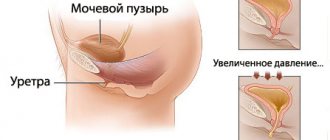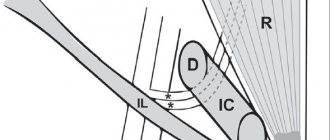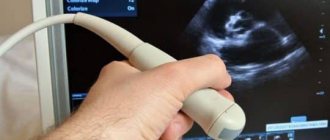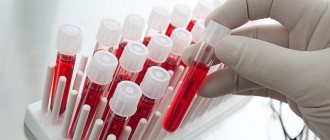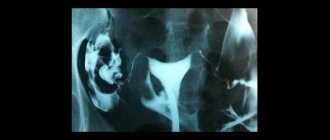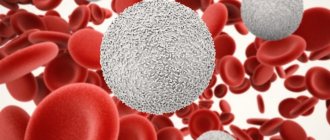Author
Tavolzhanskaya Tatyana Vasilievna
Leading doctor
Family doctor
until September 30
We're giving away RUR 1,000 for all services per visit in September More details All promotions
Blood chemistry
is a laboratory research method that allows, based on the measurement of certain parameters, to gain an understanding of the state of metabolism (proteins, carbohydrates, fats), as well as the functioning of various internal organs. This analysis is informative and has fairly high reliability. Based on the results of the analysis, specialists can get an idea of the functioning of the kidneys, liver, gallbladder, pancreas and some other organs, as well as identify deficiencies of microelements and vitamins. Biochemical blood analysis is used in gastroenterology, therapy, urology, cardiology, gynecology and other areas of medicine.
When is a biochemical blood test prescribed?
A doctor may prescribe a biochemical blood test in the following cases:
- in order to identify pathology. A biochemical blood test can help identify abnormalities in the functioning of a particular organ, even if there are no symptoms. That is why doctors recommend donating blood for biochemistry analysis twice a year as a screening examination. This will make it possible to detect diseases at an early stage, which will greatly facilitate their subsequent treatment. The detected changes in the chemical composition indicate an unfavorable situation and mean the need for medical intervention.
- To clarify the diagnosis. The results of a biochemical blood test make it possible to clarify the picture of the disease and are a necessary addition to the examination data and the patient’s complaints.
- In order to monitor the progress of treatment and the course of the disease. For this purpose, biochemistry analysis is prescribed for diseases of internal organs (kidneys, liver, pancreas), vitamin deficiencies, and intoxication of the body.
PREPARATION FOR URINE STUDIES
GENERAL RULES:
- On the eve of the study, it is recommended to obtain a sterile urine container from the Clinic office, or purchase it at a pharmacy.
- 10-12 hours before the test it is not recommended to consume: alcohol, spicy and salty foods, as well as foods that change the color of urine (beets, carrots).
- If possible, avoid taking diuretics.
- After cystoscopy, a urine test can be prescribed no earlier than 5-7 days later.
- Women are not recommended to take a urine test during menstruation.
- The patient collects urine independently (with the exception of children and seriously ill patients).
- Before taking the test, perform a thorough toileting of the external genitalia:
- in women, use a cotton swab moistened with warm soapy water to clean the external genitalia (treating the labia by moving the swab in front and downwards); Dry with a clean cloth.
- in men - the external opening of the urethra is cleaned with warm water and soap, then washed with warm water and dried with a clean napkin.
Preparing for a biochemical blood test
In order for the test results to be accurate, you should donate blood for biochemistry on an empty stomach. It's best to do this in the morning. If it doesn’t work out in the morning, then you should plan so that before donating blood for analysis, do not eat or drink anything other than water for at least 6 hours.
On the eve of the test, you should not eat fatty foods or drink alcohol. It is advisable not to smoke for an hour before the test.
If you are taking any medications, you should notify your doctor. If the medication cannot be interrupted, the study may have to be postponed.
Immediately before taking the test, it is advisable to sit down and be at rest for 10-15 minutes to eliminate the influence of physical and emotional stress on the research results.
Blood biochemistry: frequently asked questions
Over the past decades, almost no medical examination can be completed without evaluating the results of various blood tests. The most common is a general blood test. However, for a more detailed analysis of the patient’s condition, specialists can refer him for a biochemical analysis.
Who is this study for? Do you need to prepare for it? These and other questions are answered by Tatyana Nikolaevna Yankovaya, a gastroenterologist at the Expert Clinic Smolensk.
— Tatyana Nikolaevna, what can you learn from a biochemical blood test? How is it different from a general blood test?
— Despite the fact that the substrate for one and the other research is identical (it is blood), the difference between them is colossal. A general blood test is a very informative research method, but it gives us information about the state of the body as a whole: is there inflammation, anemia, etc. Traditional biochemical analysis is the determination of a group of indicators characterizing the functioning of a certain organ or organ system (for example, the liver , kidneys, pancreas, cardiovascular system).
In a word, general analysis is a more universal research method, and biochemical analysis is more specific in terms of assessing the function and identifying pathological changes in any organ or organ system.
— In what cases is a blood test for biochemistry prescribed?
— The range of biochemical research is very wide. Therefore, a biochemical blood test must be prescribed by a doctor. When selecting the required group of indicators, the doctor takes into account the patient’s complaints, the prevailing symptoms in the clinical picture, and relies on the results of other diagnostic methods.
For example, if a pathology of the hepatobiliary system is suspected, the doctor will find it useful to know the level of liver enzymes ALT, AST, GGT, and bilirubin. If it is necessary to evaluate kidney function, the doctor recommends examining the level of creatinine, urea, glomerular filtration rate, and, if necessary, electrolytes (calcium, sodium, potassium, etc.). To clarify the pathology of the cardiovascular system, it is informative to determine lipid spectrum indicators (lipoproteins, triglycerides).
That is, in each specific case, the specialist prescribes a certain set of indicators.
— How often do you need to take a biochemical blood test and what indicators should you pay attention to?
— The frequency of testing is always determined by the doctor and depends primarily on the severity of the pathological process in a particular patient. If a patient is registered with a specialist with a compensated disease, blood biochemistry must be taken at least once a year. If the condition is decompensated, then this test will have to be taken much more often, since the doctor will need up-to-date information to correctly select treatment measures.
The frequency of the test is always determined by the doctor and it depends primarily on the severity of the pathological process in a particular patient.
Over time, new blocks of biochemical indicators appear, for example, the determination of tumor markers and hormones, the analysis of the results of which helps in making a diagnosis at an early stage of the development of pathology.
Of course, there is also a universal study of blood biochemistry. This minimal set includes determination of protein levels, some enzymes (ALT, AST, GGT), glucose, creatinine, urea, glomerular filtration rate, and total cholesterol.
— Is blood biochemistry different in adults and children?
— Of course, the norms for indicators in children and adults differ.
- What about men and women?
— They also have differences in some indicators, although most of the positions studied are identical.
— Please tell us about the preparation before donating blood for biochemistry.
— A biochemical blood test is taken on an empty stomach. 2-3 days before the expected procedure, you should not drink alcohol, fatty or fried foods. Stress factors and increased physical activity can also indirectly affect test results, so they should be avoided.
It is necessary to exclude taking medications. If a person is constantly taking any medications, they should be discontinued only after consultation with the attending physician.
— Is it possible to drink water before donating blood for biochemistry?
- No, it is not recommended. This may also distort test results.
— Do I need a referral for a biochemical blood test?
— Despite the fact that patients now have access to information and often try to independently select the list of necessary tests, I am one of the specialists who recommend initially consulting with a doctor.
Unlike a standard general blood test, blood biochemistry indicators are variable, so it is more advisable to take these tests on the direction of a doctor.
Read more about other types of analyzes in our section
Interviewed by Sevilya Ibraimova
The editors recommend:
Why do people turn yellow? Liver reboot. What are we going to clean? Shield and sword against hepatitis C. How to protect yourself and your loved ones?
For reference:
Yankovaya Tatyana Nikolaevna
Graduate of the Faculty of Medicine of the Smolensk State Medical Institute in 1993.
Has a PhD in Medical Sciences.
Currently works as a general practitioner, gastroenterologist at the Expert Clinic, Smolensk. Receives at the address: 8 March Street, 20.
PREPARATION FOR SEMEN STUDIES
GENERAL RULES WHEN PREPARING FOR SEMEN RESEARCH
The sperm is collected in a special sterile container. It is prohibited to use a condom to collect sperm (substances used in the production of condoms affect sperm motility). Before the study, sexual abstinence is required for 3 to 7 days (optimally 4-5 days after the last ejaculation). During this period, you should not take alcohol, take medications, visit a bathhouse or sauna, be exposed to UHF, or become hypothermic. When repeating the study, it is advisable to adhere, if possible, to the same periods of abstinence for a correct assessment of the results obtained over time. In the morning after sleep, you need to urinate and thoroughly clean the external opening of the urethra with warm water and soap. Collect biomaterial by masturbation, without touching the walls of the container. For research, collect the entire volume of isolated sperm.
Sperm culture (with determination of sensitivity to antibiotics)
Sperm for analysis is collected before a course of antibiotics or 2-3 weeks after it.
PREPARATION FOR HAIR AND NAILS EXAMINATION
Mineral Metabolism Analysis
Hair: Cut hair at the root from several “points” of the head - occipital part, temporal, parietal, frontal (dyed hair must be analyzed no earlier than two weeks after dyeing). Nails: For examination, cut off nails from all fingers (10 nails in total). Nails should not be varnished. The nails are placed in a clean plastic container.
Examination of nail plates for fungi: Suspicious areas of the nail (from 1-2 nail plates) are cut off and placed in a clean plastic container or test tube.
General urine analysis
For general analysis, use the first morning portion of urine (the previous urination should be no later than 2 am). Toilet the external genitalia. For men, when urinating, completely pull back the skin fold and release the external opening of the urethra. For women, spread the labia. Pour the first few milliliters of urine into the toilet. Collect the entire portion of morning urine in a dry, clean container while urinating freely. Pour 40-50 milliliters of the total volume of urine into a special container and close the lid tightly. You cannot take urine from a vessel or potty. The collected urine should be immediately delivered to the laboratory. Urine can be stored in the refrigerator (at +2° +4° C), but not more than 1.5 hours.
PREPARATION FOR FECAL STUDIES
GENERAL REQUIREMENTS:
Feces should be obtained without the use of enemas or laxatives. Collect 1-2 teaspoons of feces in a special container. Deliver to the laboratory within 3 hours after collection.
Biochemical analysis of stool
Take 2-4 g (1 teaspoon) of feces into a separate container and deliver it to the laboratory within 3 hours. Be sure to indicate the type of stool (diarrhea, constipation, normal, stool with laxatives).
Examination of feces for occult blood
Three days before the test, it is necessary to exclude meat, liver, blood sausage and all foods containing iron (apples, bell peppers, spinach, white beans, green onions, cucumbers) from the diet. Collect 1-2 teaspoons of feces in a special container. Deliver to the laboratory within 3 hours after collection.
Scraping for enterobiasis
On the eve of the study, it is recommended to obtain a special tube with a probe for collecting biomaterial from the Clinic office. For this study, a scraping is taken from the perianal folds (around the anus) by the patient himself. In the morning (without getting out of bed), before performing hygiene procedures and using the toilet, move the probe in a circular motion around the anus. Place the probe in a special tube. Deliver to the laboratory within 2 hours after collection.

